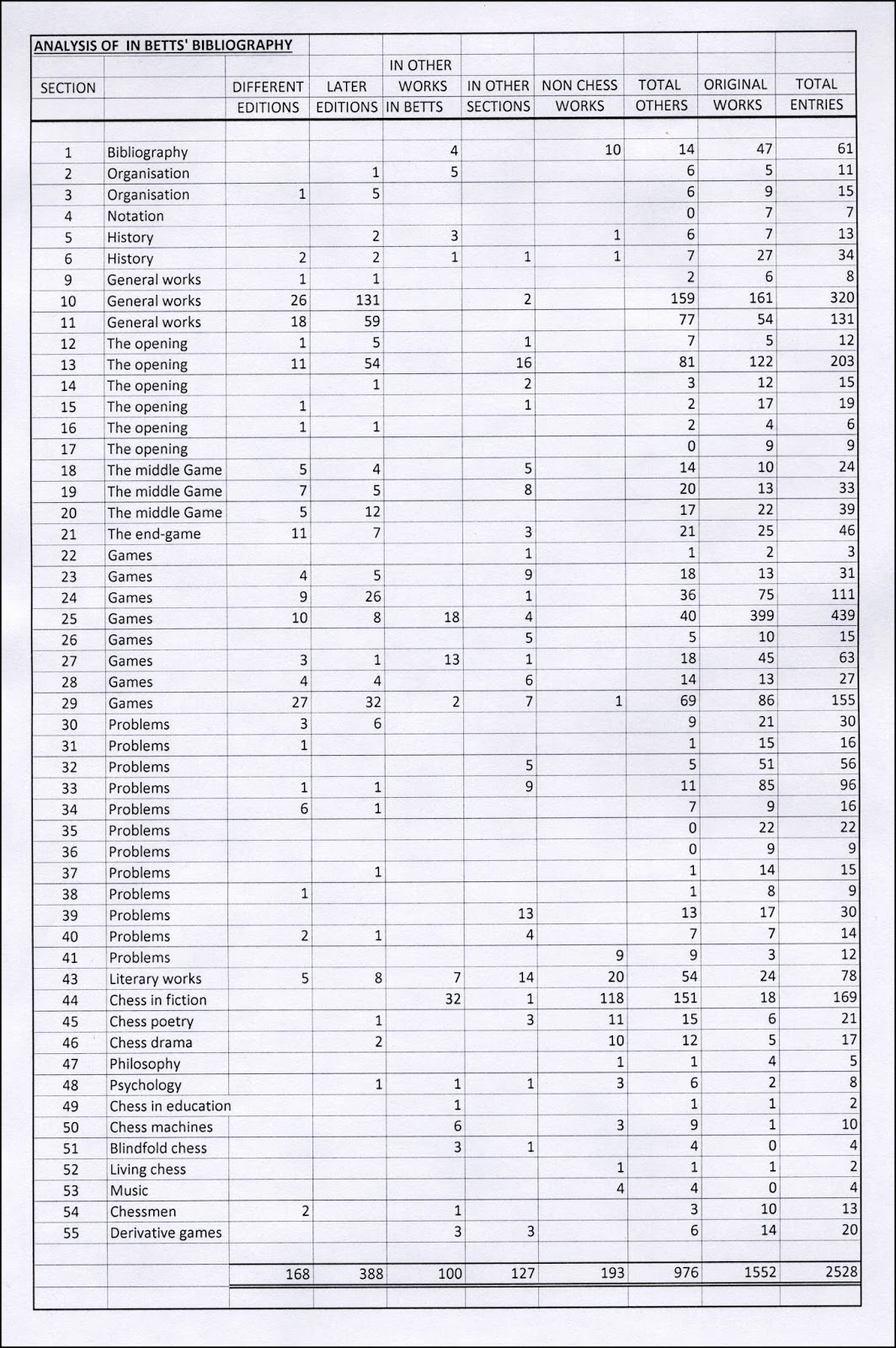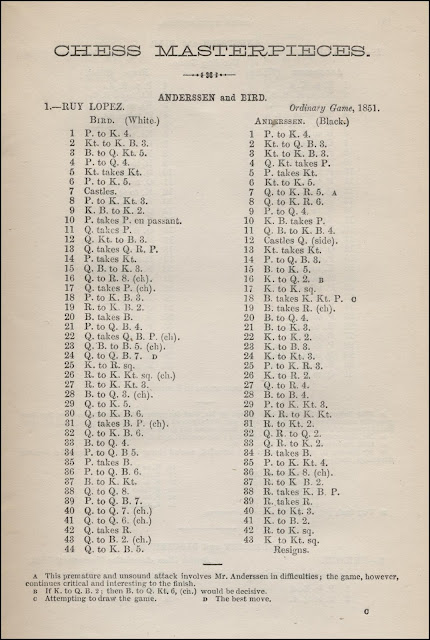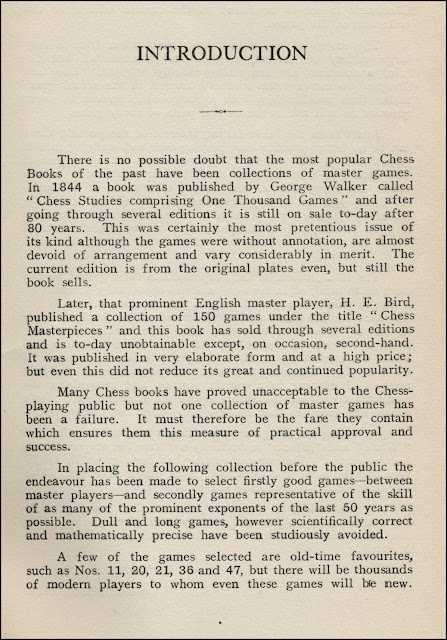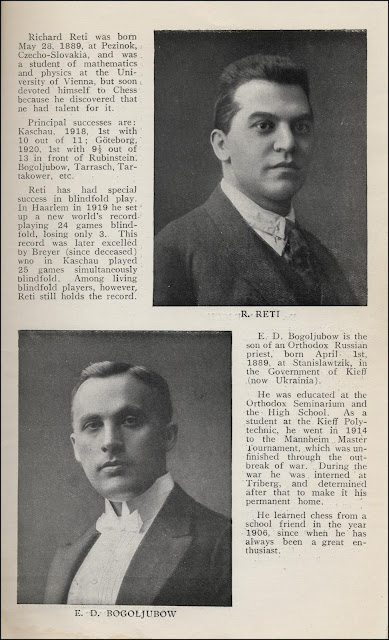Chess: An Annotated Bibliography of Works published in the English Language, 1850-1968 by Douglas Betts has a total of 2,769 entries in 55 Sections. This includes 145 in section 7-General chess periodicals, 78 in section 8-Yearbooks, and 18 in section 42-Problems periodicals.
Leaving these periodicals and yearbooks aside for the moment, the total number of entries is reduced to 2,528. However, this vastly overstates the actual number of original chess works for the following reasons:
1. Different editions of the same work, e.g. the same book published in London and New York, have separate entries.
2. Later editions are recorded separately, e.g. a later paperback or Dover edition of an earlier work.
3. 100 entries are simply articles in other works in the Bibliography, and not publications in their own right; e.g. entries 2-2 to 2-6 in section 2 on Organisation.
4. Many publications are entered in more than one section because the content is relevant to each; e.g. 19-10 Strategy & Tactics in Chess by Max Euwe which is also recorded at 18-4.
5. There are many (193) non-chess works listed which have only partial chess content. The majority of these are in section 44-Chess in fiction, and for example, nine of the twelve books in section 41 are books on recreational mathematics with some chess puzzles. An extreme example, of the non-chess works listed, is 5-7, Jewish Life in the Middle Ages in which the chess content is restricted to just two of the 478 pages.
Taking all of this into account and looking at section 10-General works, for example, 159 of the 320 entries are different or later editions of previously listed books, and section 23-Collections of end-games includes nine different or later editions and nine books entered in other sections, leaving just 13 original works out of the 31 entries. An exceptional example is section 44 where only 18 of the 167 entries are dedicated chess works, and these are novels.
The majority of entries in most sections are for original chess publications, but I calculate that the number of duplicated entries and non-chess works is 976, leaving 1,552 original chess works out of the total of 2,528.
See the table below for a full analysis:
From a bibliographical point of view it is obviously important to record every edition of each work, and this information is very useful to collectors, librarians, book sellers, chess-players, problemists, authors and editors; but here I am trying to establish the number of original chess publications.
Some "later editions" of a work are substantially different from the original edition, and these have been counted as separate books. Take for example Eugene Cook's American Chess Nuts recorded at 32-6 and 32-7. The first edition included 404 problems in 72 pages whereas the second edition had 2,404 problems and 627 pages, so these are obviously two very different books.
A few notes on some of the sections:
Section 1 - Bibliography.
Betts has listed a few auction catalogues with major chess book collections and several book dealer's catalogues with some works on chess, but he has omitted the most acclaimed and sought after item - Quaritch's 1929 catalogue of Rimington-Wilson books. There must be several hundred other catalogues by dealers, auctioneers and collectors which are not recorded.
Section 25 - Tournaments.
Entries 25-5, 25-9, 25-12, and 25-13 have German text only.
Out of the 399 original works in this section at least 250 are typescript productions often recording just the moves of the games with little else. These pamphlets are useful records of the events covered but have none of the features usually associated with a classic tournament book such as New York 1889 or Hastings 1895. They are tournament books, but not as we know it, Jim.
Section 54 - Chessmen
Although Betts included many chess book catalogues in the bibliography section, he did not include any auctioneer's, dealer's or collector's catalogues in the section on chessmen. There are, no doubt, a large number of these catalogues which are a very useful reference source for chess piece collectors and historians etc.
Reverting now to the periodical publications, there has long been a debate about how these should be counted. Should it be every single issue, each volume, or the series as a whole? Betts has taken the normal approach of recording complete runs of a periodical as a single item. Although in the section on yearbooks he has sometimes listed long sequences of these as one item, and sometimes given each year an individual entry.
The problem with listing, for example, 88 volumes of the British Chess Magazine as a single item is that this gives a very misleading number of chess books available. For this exercise I have taken the approach of counting each volume of a periodical as one item, and if volume numbers are not ascertainable I have counted each year's run as one item.
Many periodicals ended after just a few issues (at least four folded after only one issue), and these have been counted as one item, whereas a periodical that ran for 20 years, without volume numbers being evident, has been counted as 20 items.
The periodicals section in Betts is very incomplete, as he acknowledges, and furthermore, it is impossible to ascertain the full publication details of many entries. However, with the help of Di Felice's Chess Periodicals, I have drawn up the following table giving the number of volumes/years for each periodical. This shows that the 145 entries in section 7-General periodicals, comprise around 1,000 volumes/years.
I have compiled similar tables for section 8-Yearbooks, and section 42-Problem periodicals. Incidentally, there are also a few periodical publications listed in other sections, including Ken Whyld's Chess Reader which is listed in the Bibliography section at 1-52. See also 13-173, 13-176, 24-86 to 24-92, 24-106 to 21-110, 32-29, 32-48.
© Michael Clapham 2017


















































